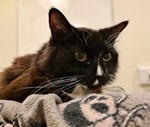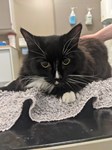Dr Ruth Gostelow
Department: Clinical Science and Services
Campus: Hawkshead
Research Groups: CPCS (Research Programme)
Clinical Groups: Small Animal Internal Medicine
Ruth is a Lecturer in Small Animal Internal Medicine at the Queen Mother Hospital for Animals (QMHA) and has a strong interest in feline diabetes mellitus and diabetic remission. She is a member of the RVC Diabetic Remission and Hyperphysectomy Clinics, with other roles including module leader for the BVetMed 4th year Endocrine module and deputy module leader for the RVC Certificate in Advanced Veterinary Practice internal medicine B-module. Ruth has also been instrumental in the recent addition of plethysmography to the QMHA.
Ruth completed an Internal Medicine residence at the RVC in 2012 and has American (ACVIM) and European (ECVIM) diplomate status in small animal internal medicine and is an RCVS-recognised specialist in small animal internal medicine. She completed a PhD in feline diabetic remission in October 2016, and was awarded the Dechra Early Career Research award for her PhD work at the 2017 ACVIM Forum. Following her PhD, Ruth has worked as a lecturer in small animal internal medicine at the RVC where she is a member of the Diabetic Remission and Hypophysectomy Clinics. Ruth acquired an RVC Animal Care Trust grant for plethysmography equipment for respiratory assessment of small animal patients at the QMHA in 2017 and is a co-applicant on a recently-successful ECVIM clinical studies fund grant to examine the genetics of diabetes mellitus in Burmese cats. She completed the RVC Postgraduate certificate in veterinary education (PGCertVetEd) in 2018 and is a Fellow of the Higher Education Authority.
Ruth has a keen research interest in feline diabetes mellitus, particularly feline diabetic remission and the genetics of Type 2-like diabetes in cats. She currently supervises a PhD scholar investigating the genetics of feline diabetes and has recently launched a project, alongside other investigators, to investigate the genetic basis of diabetes mellitus in Burmese cats using whole genome sequencing. Further details of this project can be found at: https://www.rvc.ac.uk/research/research-centres-and-facilities/clinical-investigation-centre/projects/investigation-of-genetic-risk-factors-of-diabetes-mellitus-in-european-burmese-cats
Hazuchova K, Gostelow R, Scudder CJ et al. (2018) Acceptance of home blood glucose monitoring by owners of recently diagnosed diabetic cats and impact on quality of life changes in cat and owner. J Fel Med Surg; 20(8):711-720.
Gostelow R, Hazuchova K, Scudder CJ, et al. (2017) Prospective evaluation of a protocol for transitioning porcine lente insulin-treated diabetic cats to human recombinant protamine zinc insulin. J Fel Med Surg; Mar 15 (online).
Gostelow R, Scudder CJ, Keyte S, et al. (2017) Pasireotide long-acting release treatment for diabetic cats with underlying hypersomatotropism. J Vet Int Med; 31(2): 355-364.
O’Neill D, Gostelow R, Orme C, et al. (2016) Epidemiology of diabetes mellitus among 193,435 cats attending primary-care veterinary practices in England. J Vet Int Med; 30(4):964-7.
Scudder CJ, Gostelow R, Forcada Y, et al. (2015) Pasireotide for the medical management of feline hypersomatotropism. J Vet Int Med; 29(4): 1074-80.
Gostelow R, Forcada Y, Graves T, et al. (2014) Systematic review of feline diabetic remission: separating fact from opinion. Vet J; 202(2):208-21.
Gostelow R, Bridger N, Syme HM. (2013) Plasma-free metanephrine and free normetanephrine measurement for the diagnosis of pheochromocytoma in dogs. J Vet Int Med; 27(1):83-90. Awarded the Society for Comparative Endocrinology award for best veterinary endocrinology paper published in 2013.
Conference Abstracts:
Teesdale Twyford G, O’Neill D, Church D, Brodbelt D, Gostelow R. Is previous glucocorticoid therapy associated with the likelihood of diabetic relapse among cats in diabetic remission? Oral abstract, BSAVA 2018.
Hazuchova K, Holder A, Gostelow R et al. Functional impact of single nucleotide polymorphisms within the putative promoter of feline ACP1 gene in lean Domestic Shorthair cats with diabetes mellitus. Oral abstract, ECVIM Congress 2018.
Hazuchova K, Gostelow R, Scudder CJ, et al. The effect of monthly injections of GLP-1 analogue exenatide extended release on β-cell function in newly diagnosed diabetic cats. Oral abstract, ECVIM Congress 2018.
Gostelow R, Scudder C, Hazuchova K, et al. One-year prospective, randomized trial comparing efficacy of glargine and protamine zinc insulin in diabetic cats. Oral abstract, ACVIM Forum 2017.
Gostelow R, O’Neill D, Brodbelt D, et al. Diabetic remission in cats examined in UK primary-care veterinary practices: occurrence and risk factors. Oral abstract, ACVIM Forum 2017.
Awarded 2017 Dechra Early Career Researcher Award for above two abstracts
Gostelow R, Scudder C, Church D, Niessen SJM. Evaluating the efficacy of human-recombinant protamine zinc insulin in feline diabetes mellitus: A three month prospective clinical trial. Oral abstract, ECVIM Forum 2015.
Gostelow R, Church D, Niessen SJM. Transitioning of porcine insulin lente-treated diabetic cats to a human-recombinant protamine zinc preparation. Oral abstract, BSAVA Congress 2015.
Ruth's teaching duties include small group teaching and lecturing of BVetMed undergraduate students, including clinical teaching of those on rotations, and teaching of senior clinical training scholars (MVetMed postgraduate students) in the QMHA. She was been module leader for the BVetMed feline medicine elective from 2016 to 2018, is module leader for BVetMed year 4 endocrine strand, and is also deputy module leader for the RVC CertAVP B-module in Small Animal Practice. Her assessment duties include being examiner for the CertAVP C-module in internal medicine and B-module in Small Animal Practice, and assessment and guidance of BVetMed final year research projects. She has written examination questions for both CertAVP and BVetMed examinations and contributes to RVC CPD provision through Webinar Plus online course development. She is a fellow of the Higher Education Authority.
Ruth enjoys all aspects the the Internal Medicine caseload at the QMHA, but has a particular interest in endocrine diseases. This includes the use of novel monitoring methods for diabetes mellitus, including the RVC Pet Diabetes App and the use of flash glucose monitoring systems. Ruth has also worked to promote respiratory medicine at the QMHA, including the recent introduction of whole-body plethysmography and has introduced topical antifungal therapy for canine and feline sinonasal Aspergillosis as a service through the internal medicine service. She is also a memeber of the RVC Radioactive Iodine Therapy team.
Updates on research conducted through the RVC Diabetic Remission Clinic can be found on our Facebook page: www.facebook.com/RVC.Diabetic.Remission.Clinic/
-
Feline Diabetic Diet Research Trial : Reglucat study
This research trial (REGLUCAT) will assess the ability of a new feline prescription diabetic food to promote weight loss - and hopefully diabetic remission - in diabetic cats who are overweight to some degree.
This research aims to provide a new and effective form of treatment for overweight diabetic cats, using dietary change to promote diabetic remission.
Identifying treatments that can achieve diabetic remission will encourage many owners to pursue treatment and will greatly improve the quality of life for diabetic cats.
-
Feline Diabetic Diet Research Trial : Reglucat trial
People: Ruth Gostelow, Amrita Mohanty, Lucy Davison
The RVC Diabetic Remission Clinic is recruiting for a 1-year trial examining the ability of a new prescription diet to promote weight loss and diabetic remission in overweight cats with diabetes mellitus. The trial period will last for 1 year; cats will only be fed the test diet for the first 12 weeks and will be then monitored up to 52 weeks. Patients will attend 7 consultations at the RVC Queen Mother Hospital for Animals at the RVC in Hertfordshire. The project will also investigate how achieving diabetic remission, and weight loss, affects the gut microbiome of diabetic cats.


